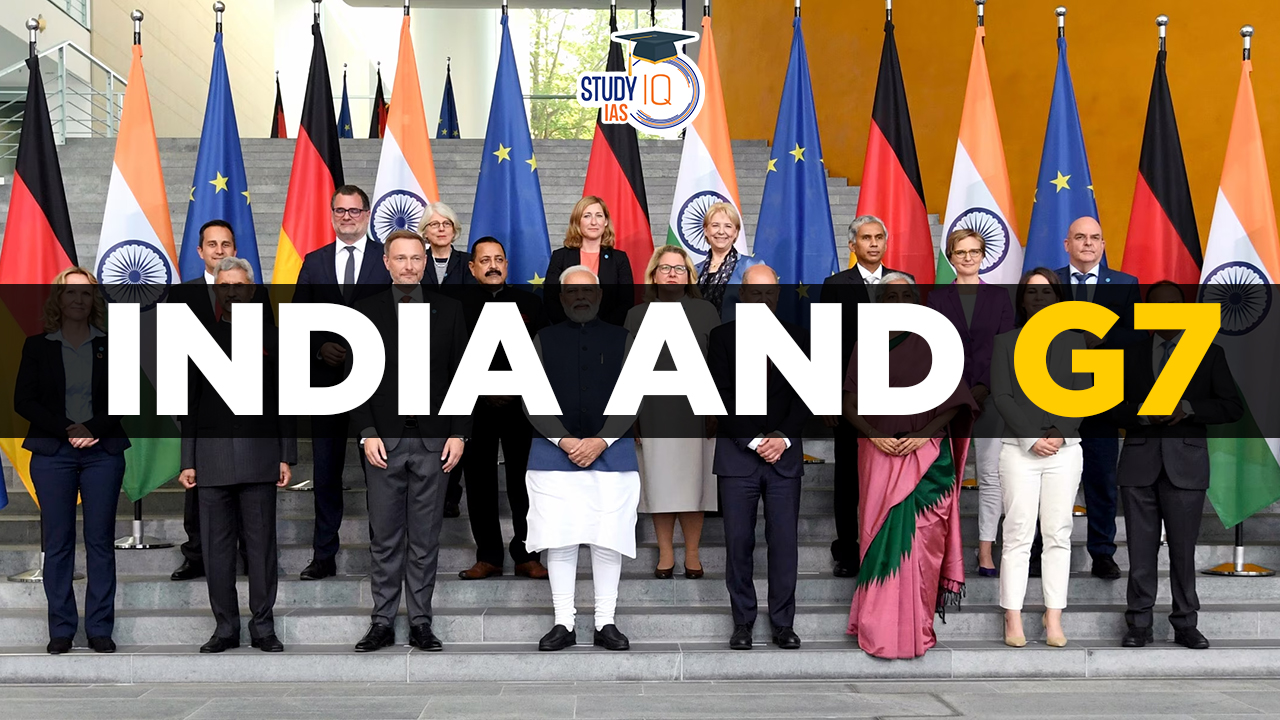Table of Contents
Context: Prime Minister Narendra Modi heads to Italy for the G7 Summit 2024, his first overseas visit after assuming office for the third term. G7 Summit 2024 is scheduled to be held between June 13-14 in Italy.
What is Group of Seven (G7)?
- It is an intergovernmental organisation that was formed in 1975.
- The bloc meets annually to discuss issues of common interest like global economic governance, international security and energy policy.
- The G7 countries include the UK, Canada, France, Germany, Italy, Japan and the US.
- China and India are not part of the grouping.
- India has been invited to the G7 every year since 2019.
- The G7 does not have a formal charter or a secretariat.
- The presidency, which rotates among member countries each year, is in charge of setting the agenda. Sherpas, ministers and envoys hammer out policy initiatives before the summit.
- The G7 addresses a broad range of global issues including economic stability and growth, climate change, international security, health, gender equality, and humanitarian efforts.
Origins and Evolution
- 1973: The G7’s roots lie in an informal meeting of finance ministers from France, West Germany, the U.S., U.K., and Japan to address the 1973 oil crisis and resulting economic woes.
- 1975: The first official G6 Summit takes place in France, with Italy joining the original five members.
- 1976: Canada joined, forming the G7.
- 1991: The G7 Summit in London expands the group’s focus beyond economics to include global security.
- 1994: Russia is invited to join, creating the G8.
- 1997: The G8 Summit in Denver produced the G8 Action Plan on Africa.
- 2014: Russia’s annexation of Crimea led to its suspension from the group.
- 2015: In the G7 Summit (Germany) the G7 Declaration on Responsible Leadership in the Global Economy was adopted.
Significance of G7 for India
- Economic Cooperation: India’s engagement with the G7 nations is crucial for economic cooperation.
- The G7 countries are some of India’s major trading partners, and closer economic ties could help India expand its markets and improve economic growth.
- For instance: G7 announced the collective mobilisation of 600 billion dollars by 2027 under the Partnership for Global Infrastructure and Investment (PGII).
- Technological Advancements: The G7’s technological prowess, particularly in renewable energy, artificial intelligence, and digital technology, offers India opportunities for technology transfer and collaboration.
- Strategic Partnerships: India’s strategic partnerships with G7 members like the US, UK, France, Germany, and Japan are vital for addressing global challenges such as the Indo-Pacific region, countering China’s influence and ensuring regional stability.
- Global Governance: India’s participation in the G7 reflects its growing relevance as a major economic power and its role in remaking the post-World War II order for the 21st century.
- Democracy and Human Rights: The G7 promotes democratic values and human rights, aligning with India’s principles and contributing to a shared approach to global governance.
- Environmental Concerns: With the G7 committed to environmental protection and reducing greenhouse gas emissions, India can collaborate on climate change initiatives and sustainable development.
- For instance: In 2022 at the G7 summit LiFE (Lifestyle for Environment) campaign was promoted by India and also invited G7 countries into the huge market for clean energy technologies in emerging economies.
- Peace and Security: The G7’s commitment to international peace and security resonates with India’s foreign policy objectives, allowing for joint efforts in conflict prevention and resolution.
Significance Of India For G7
India’s presence at the G7 table holds significance for both sides. Here’s a breakdown of why India is important to the G7:
India’s Economic Rise
- India is now the world’s 5th largest economy, surpassing Germany, France, Italy, and Canada.
- The IMF projects India to be one of the fastest-growing economies globally. The IMF has raised India’s growth projections for 2024 from 6.5% to 6.8%.
- This economic strength makes India a country the G7 cannot afford to ignore.
Strategic Importance in the Indo-Pacific
- The global geopolitical and economic focus is shifting towards the Indo-Pacific region.
- European G7 members (UK, France, Germany) are formulating strategies to engage with the region.
- India’s presence in the Indo-Pacific is crucial for Western countries due to:
- Countering China’s expanding influence.
- Accessing economic opportunities in the region.
- India has strategic partnerships with the US, UK, France, Germany, and Japan.
Key Groupings Where India Plays a Role
- SAARC (South Asian Cooperation): An economic and political organisation navigating challenges in South Asia, including the economic crisis in Sri Lanka, the Taliban takeover of Afghanistan, and Pakistan’s political and economic woes. India has provided financial aid to Sri Lanka and social assistance to Afghanistan.
- SCO (Shanghai Cooperation Organization): A political, economic, security, and military alliance spanning continents. India advocates for action against terrorism within the SCO.
- BRICS (Emerging Economies): An alliance of Brazil, Russia, India, China, and South Africa, formed in 2009 to bolster economic cooperation. While security concerns exist with China, BRICS has fostered economic partnership between India and China.
- Global South: India’s participation in the G7 will contribute to Global South countries. G7 focuses on the Global South because the US and China have been competing for their influence in the Global South countries.
- But this situation accelerated when Russia’s aggression toward Ukraine started.
- Despite G7 countries asking the international community to cooperate with the sanctions against Russia, a certain number of Global South countries did not agree.


 Crime Against Humanity (CAH Treaty)
Crime Against Humanity (CAH Treaty)
 India-Sri Lanka Relations, Areas of Coop...
India-Sri Lanka Relations, Areas of Coop...
 White House reveals plan to tackle anti-...
White House reveals plan to tackle anti-...




















